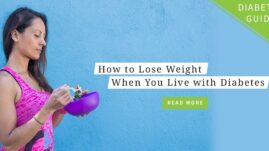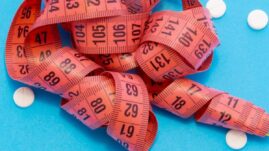We all know what tends to happen after a successful diet, right? We go back to eating like we used to (and perhaps even have a few cheat meals with the foods we have missed the most), and in no time, our weight is back to where it was before we started dieting.
Even if we do everything right, don’t pig out, and just eat enough healthy foods to get the calories we need to maintain our new weight, the sudden jump in calorie intake can make us put on a lot of unnecessary fat.
I know this feeling very well. After my fitness competition last year, I actually wanted to put some weight back on, so I just went straight back to eating normally (plus some…) and I gained a lot of unnecessary body fat in the process that I had to spend far too much time getting rid of again.
Right now, I’ve just finished four weeks of dieting for our October 27th photoshoot with NuFit, and this time my plan is to do everything right and not put the weight back on. That means Reverse Dieting.

What Is Reverse Dieting?
Reverse Dieting is a method to get back to a healthy and sustainable calorie intake after a period of dieting. The idea is to slowly add high-quality calories back into your diet and build up your metabolism to handle the calorie increase.
Let’s say you have been following a 1,300-calorie diet and want to get back to eating 1,800 calories/day (you can learn how to calculate your daily calorie need in this post). Your reverse diet would be to add perhaps 100-150 calories/day each week until you are at 1,800 calories/day. This means that you would be reverse dieting for three to five weeks, depending on how sure you want to be that you won’t put weight back on.
Reverse dieting is a very simple concept but not always easy to do. You naturally want to just end your diet when you reach your goal, and adding three or more weeks to it can seem like a lot. In fact, the reverse dieting phase is often harder for people to get through than the diet itself because you don’t have that clear goal of seeing your weight decrease to motivate you. I know it is for me, as I am not the most patient person when I don’t have a clear, short-term goal to follow.
The best way to think about reverse dieting is to decide up front that your diet simply isn’t over until you are back at a sustainable calorie intake without having put too much weight back on (you will always put on a little weight when you start eating more, so don’t worry If your weight increases 1-2 pounds from what it was when you ended the regular diet phase).
My Reverse Diet
I didn’t want to diet super hard, but, ultimately, I had to cut my calories back to about 1,350 per day for the last few weeks to get in the shape I wanted. I also added a lot of cardio, which anybody who knows me knows that I don’t do lightly (cardio is not my most favorite thing in the world). I lost almost 10 pounds in five weeks, which was perfectly in line with my goal.
Now, I want to get back to my old maintenance calorie intake of 2,000 calories or more per day. I have a healthy appetite and love to eat, so why not 😀

The shoot was on Tuesday and my plan is to stay at around 1,400 calories/day for the rest of this week (after we had one big burger dinner when we finished the shoot). I also won’t work out at all, because I want to give my body some rest.
The following week I’ll go back to lifting weights, but the cardio sessions are done for now. I plan on lifting heavy and increasing my calories to 1,500/day plus a weekly treat meal for the following month. I’ll then add in about 200 calories/day on a monthly basis after that. If I start gaining fat too quickly, I’ll scale back and let my body adjust. This is a very long reverse diet, but I have the time, so better safe than sorry. I am excited to see how that all pans out…
Should You Do Reverse Dieting?
If you have been dieting for a long time (or chronically under-eating), it’s probably not a good idea to shock your system by suddenly adding a lot of calories. On the other hand, if you use reverse dieting and continue to keep your diet 90-100% clean, your body might just welcome the extra calories.
There is really no reason not to use reverse dieting if you want to maintain all your hard-earned results and make a sustainable change to the way you look.




Jo
I’m eating 800 calories a day. How much do you think I should be adding per week?
Christel Oerum
I can’t guide you on exactly how much to eat. I would add 200-300 calories right now, or at least 100 per week
josefo
I am extremely surprised to see such a good article and commnect from you answering everyone adapting the answer to each person! bravo !
Did come to see this article after losing 14KG in close to 4 months while lifting 6x a week and at 1500kcal for a male 171cm, it has been hard, but im preparing my excel tabels for the reserver diet once i lose my final 4KG.
So if i get everything right :
Start with 100kcal extra per week, first week can shock us due to fiber and carbs that holds water, stay focus, check weight second week, if its the same or down, can increase, if the weight did increase, should hold for a week to see result next week, is this correct ? 🙂
Thank you !
Christel Oerum
Thank you, and yes. There are some newer theories as to how to do this, one being that you should just be able to “jump” up to your maintenance calories and be fine. I think the problem is that most don’t know their maintenance calorie level and most freak out a little bit when they see significant weight gain due to water (and waste) ?
Maria
Hi, I’ve found this so useful!! All articles are usually about people over weight so I struggle to see a clear way forward. I have been under eating for years (under 1200 cals) fairly balanced but not enough protein I work out 5 times a week and I never seem to get any closer to where I want to be. I’m not under weight I’m classed as Normal 5ft 3 and 121 lbs. The thought of eating more petrifies me but I know it’s got to be done not just for appearance but for my health. The past week I’ve upped my calories to 1700 but already feeling the effects on my waistline. Rather than reverting back to my under eating I will give this a go. Thank you
trixy
My previous weight was 71kg and now it’s only 52. what I eat often does not reach 1000 calories. but now I don’t know what to do to maintain my 52 weight. What should I do? should i follow what tdee is telling me to take in 1600 calories to maintain my weight? or should i gently add 50-100 calories every week until i reach 1600.
Christel Oerum
It’s up to you, both methods should work. It might feel like a lot of additional food if you add 600 a day, so if you’re more comfortable adding it slowly you can do that
Jon Paul
Hey I just finished doing a 9 week cutting phrase and started my reverse dieting 4 days ago and I am up 7 pounds. I wasn’t in a big of a deficit. I was at a 300 calories deficit. I have only added 150 calories and I am up a lot of weight.
Christel Oerum
There’s no way that you’ve gained 7 lbs. of fat in 4 days, so you want to look to other reasons for the weight gain. If you’ve upped your carbs your body will be holding onto more water. And since you’re eating more you might also have more waste in your system. But I completely understand that it can be mentally hard to see the numbers go up
Melissa Ministro
I was wondering if I could add 100 – 200 calories each month instead of each week. Would that effect it any way possible?
Christel Oerum
Sure, if you have the patience for that, I don’t see why not.
Krrish Wadhawan
i was at 116kg and by lifing and cardio mixed together with a 1300-1500 calorie diet i am now 90.5kg I’m 6’1 and now i want to decrease cardio and increase muscle training and diet as muscle training requires much more energy so in about 5 days i lifted my diet upto 2000 calories like first day 1500 second 1700 third 1900 and 4th and 5th 2000 but in these few days i gained back 1 aprox 1kg and i don’t know its fat or muscle but as i was on low intensity for a month in between (home workout) and now joined gym again so i am guessing its muscle gain + fat gain but now i wanna know your opinion and what you have to say about it i am so confused about it.
Christel Oerum
1kg in 5 days due to increased calories is most likely waste and water. You’re taking in more volume plus most likely more fiber and carbs, so you’ll have more waste in your system and the carbs/fiber binds water. You need months of consistent training so start seeing significant muscle growth
00expresso00depresso
is it okay if i reverse dieting as well after eating 1600 calories a day? I also very MUCH don’t want to gain any weight back, but as well not lose it so that i’m underweight, just want a good healthy body i can show and love.
I’m also trying to get to 1,800. How many calories should i add gradually?
Christel Oerum
If you’re nervous you could try adding in 100 calories a day for a week and see how that goes. Remember, if you add more carbs you most likely will bind more water which will make your weight increase BUT not your bodyfat
elise
Do you think it would be ok for me to try reverse dieting after eating 1,200 calories a day? I don’t want to gain any weight back, but I also don’t really want to lose anymore weight. I’m trying to get to 1,800. Is that enough calories, or do I need more?
Christel Oerum
I can’t tell you what your maintenance calories are. I would add a few hundred calories for a week or two and then add more until you get to your maintanance level